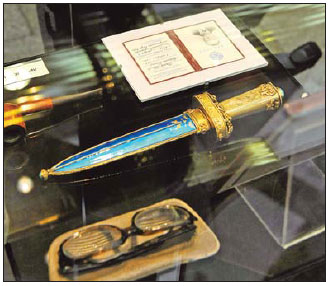Society
Moscow museum reveals old secrets
Updated: 2011-01-05 08:28
By Dmitry Zaks (China Daily)
|
The belongings of British double agent Kim Philby are displayed at the exhibition 90 years of Russia's Foreign Intelligence Service in Moscow, on Dec 22. Natalia Kolesnikova / Agence France-Presse |
MOSCOW - Soviet spy veteran Grigor Vardanyan looked at Kim Philby's immaculately-kept pipe and sighed.
"He was such a cultured man," the former agent said of one of Britain's most notorious turncoats.
"So educated. So well prepared. He served our cause until the end."
Such fond memories were being murmured through the great halls of Moscow's World War II museum as Russia's Foreign Intelligence Service, in a rare exhibition, revealed the tools it has been using for the past decades to outsmart the West.
There was the British "Cambridge Five" member Philby's Olympia Splendid 99 typewriter and KGB identification card.
There was the letter John F. Kennedy signed authorizing the exchange of Soviet KGB Colonel Rudolf Abel for the downed US pilot Gary Powers in 1962.
And there was a coded message from Igor Kurchatov, the father of the Soviet atomic bomb, who seemed so desperately unhappy with his team of locally trained scientists.
"All the data indicate that the feasibility of solving this problem is much greater than our scientists - who are unfamiliar with the work ... being done abroad - think," Kurchatov bravely told Joseph Stalin, the late Soviet leader, in 1943.
The treasure chest of spying memorabilia was cracked open to celebrate some of the Service's most memorable achievements since its founding 90 years ago by the man known fearsomely as "Iron Felix" Dzerzhinsky.
"Thanks to the Service, our nation's sphere of influence stretched to over a third of the world," said serving Foreign Intelligence Service adviser Vladimir Volkov. "But there have since been some losses and failure."
The years of glory seem now to have indeed been replaced by a dark period that has some wondering about the brains behind the Russian intelligence service - a point not lost on some of the silver-haired veterans.
"I think the older generation will have to teach the younger generation how it really ought to be defending the motherland," said one Soviet spy, who gave his name only as Alexei Nikolayevich.
He was specifically talking about a senior Russian operative who betrayed his country this summer and handed 10 sleeper agents over to the United States, including the glamorous "femme fatale" Anna Chapman.
But that has not been the only failure.
Russia is also waging seemingly monthly spy battles with Britain and is having similar problems with a number of countries from the former Warsaw Pact bloc.
And Spain recently confirmed a press report that it had expelled two Russian diplomats for "activities incompatible with their status" - diplomatic-speak for spying.
And some critical analysts say Russia has essentially wasted its network of Soviet sources and is now largely useless in providing intelligence for such critical hot spots as North Korea and Afghanistan.
The optimists counter that the Service has never had so many agents whose reach has gone quite so far. Some might even argue that Prime Minister Vladimir Putin is all but entrusting the Service with helping Russia catch up with the West.
The country's former president told state television this month that the Service would be wise to shift its focus from war rooms to technology hubs.
Putin said the country's IT and high-tech sectors were doing the best job they could. But they needed help - help that could be either "intercepted ... or bought".
Such methods are not unfamiliar to Vardanyan.
He met Philby for the first time after serving his final tour of duty in Afghanistan and spent two years wandering the streets with the historic figure until the former British intelligence agent's death in 1988.
Some accounts say that Philby had by that stage become a wreck of a man who was disillusioned with the Soviet Union and was turning increasingly to drink.
But that was not how Vardanyan remembers the man he calls fondly "one of the brightest of all (the people) I met".
"It is impossible to forget him. What he did for us was simply magic."
Agence France-Presse
(China Daily 01/05/2011 page10)
E-paper

Ear We Go
China and the world set to embrace the merciful, peaceful year of rabbit
Preview of the coming issue
Carrefour finds the going tough in China
Maid to Order
Specials

Mysteries written in blood
Historical records and Caucasian features of locals suggest link with Roman Empire.

Winning Charm
Coastal Yantai banks on little things that matter to grow

New rules to hit property market
The State Council launched a new round of measures to rein in property prices.

